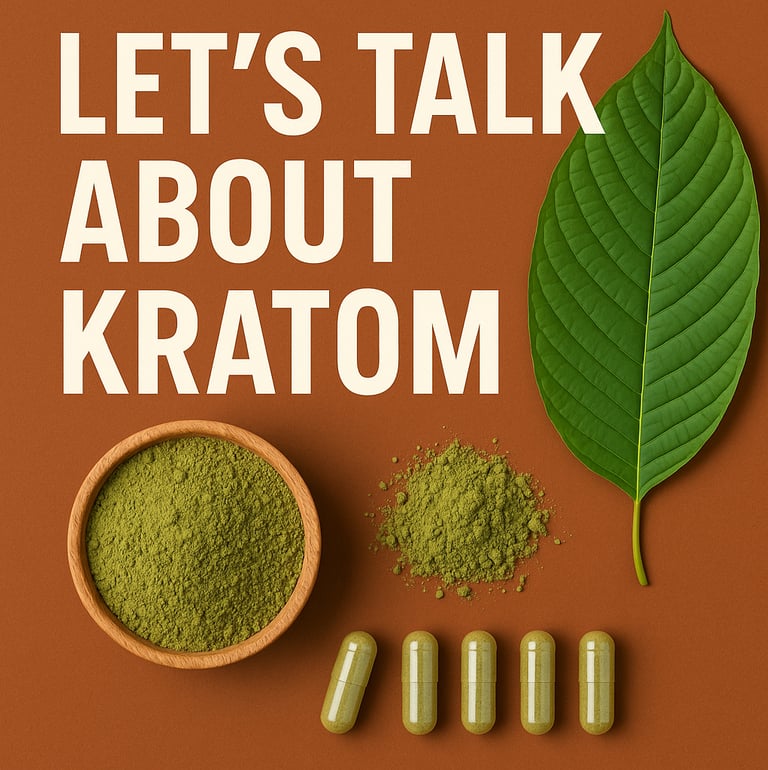
Let's Talk About Kratom
This blog post delves into the complexities of kratom, a substance derived from the Mitragyna speciosa tree, discussing its stimulant and sedative effects, potential for addiction, and its controversial role in opioid withdrawal. It also highlights the importance of dosage, individual responses, and the lack of regulation surrounding kratom supplements, urging caution for both new users and those considering it as an alternative to traditional opioids.
PREVENTION AND EDUCATION
Robert J Woldhuis
11/6/20252 min read


Exploring Kratom: Risks, Benefits, and Alternatives in the Context of Opioid Use
An AI Youtube Summary of the Video by Andrew Huberman on Kratom Risks.
Welcome to the Huberman Lab podcast, where we discuss science and science-based tools for everyday life. In this Ask Me Anything episode, we explore the substance kratom, its effects, and its implications in the context of the ongoing opioid crisis.
What is Kratom?
Kratom, derived from the leaves of the Mitragyna speciosa tree native to Indonesia, has been used for centuries. Traditionally, chewing the leaves produces a mild stimulant effect. Today, kratom is often consumed in capsule or powder form, with varying concentrations of its active compounds.
Effects of Kratom
Kratom exhibits two primary effects depending on the dosage:
Low Dosages: At lower doses, kratom acts as a stimulant, providing increased energy and alertness.
High Dosages: At higher doses, it functions as an analgesic (painkiller) and sedative, mimicking the effects of opioids.
The Opioid Crisis and Kratom
The opioid crisis, primarily affecting the United States, involves widespread addiction to prescription opioids like morphine and oxycodone. Kratom's opioid-like properties have made it a controversial topic, especially as some individuals claim it has helped them wean off stronger opioids. However, kratom itself can also be habit-forming and addictive.
Addiction Potential
Kratom can lead to addiction, particularly when taken in higher doses. Users may experience withdrawal symptoms similar to those associated with traditional opioids. The distinction between habit-forming and addictive substances is crucial; addiction implies continued use despite negative consequences.
Perspectives on Kratom
Responses to kratom are polarized:
Negative Experiences: Many users report addiction and withdrawal symptoms, leading to rehabilitation needs.
Positive Experiences: Conversely, some individuals and medical professionals argue that kratom can be a useful tool for tapering off stronger opioids, provided users adhere to lower dosages.
Medical Opinions
Experts suggest that if you have not tried kratom, it is wise to avoid it altogether. For those already using it, careful consideration of dosage is essential. Individual responses to opioids vary significantly, with some people experiencing heightened euphoria and addiction potential.
Pharmacology of Kratom
Kratom acts on the endogenous opioid system, binding primarily to the mu-opioid receptors in the brain, similar to morphine and hydrocodone. This binding leads to pain relief and euphoria, albeit at lower potency than traditional opioids.
Misconceptions
A common misconception is that kratom does not activate the dopamine system, thus making it non-addictive. However, it does indirectly activate reinforcement pathways involving dopamine and serotonin, contributing to its addictive potential.
Risks Associated with Kratom
While fatalities directly linked to kratom are rare, they can occur, especially when combined with other substances like alcohol. High doses increase the risk of respiratory failure, a significant concern shared with traditional opioids.
Conclusion
Kratom is not a benign substance. Its potential for addiction is real, and while it may help some individuals transition away from stronger opioids, it can also trap users in a cycle of dependency. If you have not used kratom, it is advisable to avoid it. For those currently using it, monitoring dosage and being aware of individual responses is crucial.
Final Thoughts
The Huberman Lab podcast aims to provide insights into mental health, physical health, and performance. The discussion around kratom highlights the need for careful consideration of the benefits and risks associated with any substance, particularly those with opioid-like effects.
For further exploration of these topics, consider subscribing to the Huberman Lab premium channel, which supports ongoing research and provides additional resources for understanding mental and physical health.

